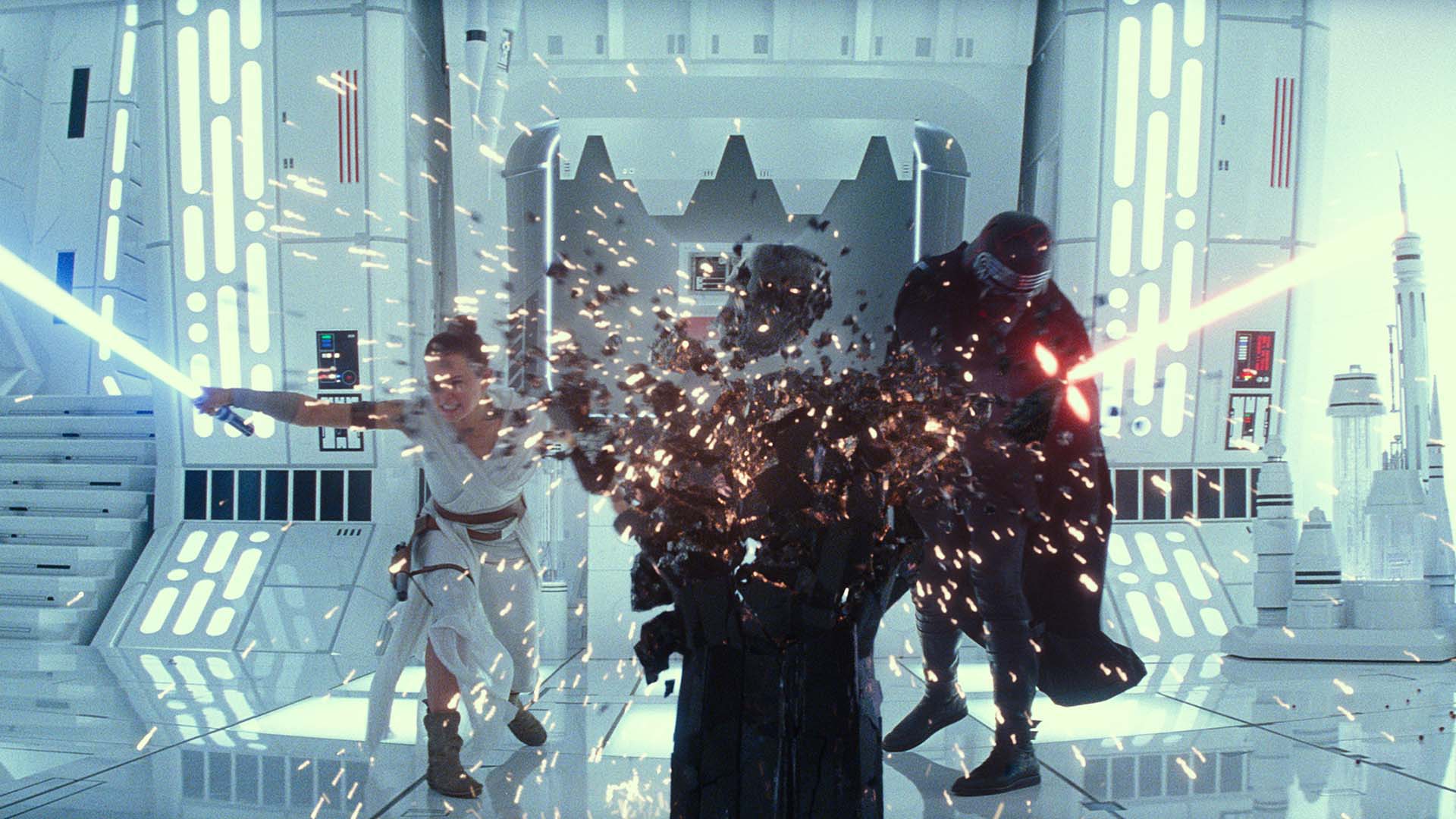Star Wars: Episode IX — The Rise of Skywalker
Chaotic and inconsistently paced, this big dose of fan service gets a few things deliciously right and a lot disappointingly wrong.
Overview
UPDATE: April 28, 2020: Star Wars: Episode IX — The Rise of Skywalker is available to stream via Google Play, YouTube and iTunes — and via Disney+ from Monday, May 4.

Pity the fool who directs a Star Wars movie these days, even if that fool is JJ Abrams. It feels like a long time ago, in a galaxy far, far away from the internet, when fans only interacted with films at the cinema and movies survived or died largely on merit alone. Back then, criticism and praise happened in private — between friends, colleagues and, occasionally, strangers at conventions. Now, films can fail before they're released. Emboldened by online anonymity and pocket-sized megaphones, devotees decry everything from casting choices to millisecond-long trailer grabs. To borrow from A New Hope, it's as if millions of voices suddenly cried out in terror that a woman was cast in the lead, or a stormtrooper was both black and friendly. "Thanks for ruining my childhood" became the catchcry for anyone who felt they didn't see the movie they wanted to and, unfortunately, studios started listening.
It's in this context that the third and final film in Star Wars' sequels trilogy arrives. Reactions to Rian Johnson's The Last Jedi were as polarised as the entire franchise had seen — with some praising his efforts to reimagine swathes of lore and actually deliver something new for the first time in nearly 30 years, and others (most, even) tearing the film down. Cries of disrespect rang long and loudly as OG fans believed that their beloved characters had rejected everything they'd once stood for. Sure, Johnson dropped the ball on a number of fronts, but at least he tried something different.
Star Wars: Episode IX — The Rise of Skywalker does not try anything different. It retreats to the safest possible territory, borrowing heavily from Return of the Jedi to round out a trilogy crippled by an absence of cohesion. Like 2018's Ready Player One, nostalgia is the film's oft-used trump card, relying almost entirely on familiar visual or musical moments to trick you into thinking you're watching something clever or special. The end result is a chaotic, inconsistently paced, 142-minute package of fan service that gets a few things deliciously right and a lot disappointingly wrong.
The Rise of Skywalker's best parts, as has been the case across this trilogy, stem from the relationship between Rey (Daisy Ridley) and Ren (Adam Driver). As the only enduring, meaningful source of mystery, Ridley and Driver again deliver committed performances filled with emotion and raw physicality — and both deserved a far greater story. Here, they're after the same thing: the somehow-resurgent Emperor Palpatine. We say 'somehow', because at no point does the film substantially address this crucial point. At least soaps like Dynasty offered explanations when they pulled this narrative trick (it's his evil twin; he fell off a boat and had amnesia; he was in protective custody). For Abrams, Palpatine is just back. In fact, he never left. Still, it's a joy to see Ian McDiarmid reprise one of cinema's greatest villains, with his scenes among the movie's highlights.
Another strength, of course, is The Rise of Skywalker's special effects. As always, they're dizzying and dazzling. The large-scale planets and battles are amazing because Industrial Light & Magic — the company that helped kick-start incredible SFX back in 1977 — continues to push new boundaries, but the imagery particularly impresses in smaller ways. The ongoing commitment to practical effects (those that actually happen live on-set), for example, and managing to not only keep Carrie Fisher on-screen two films after she died, but to ensure that Leia remains the franchise's best character. The wizardry behind these posthumous performances must give pause to all working actors; however credit also goes to the writers for holding true to everything that made Leia an iconic hero in the first place. Her lines are limited but her actions speak volumes, and the film's most emotional moments belong to her.
Others don't fare nearly as well. Kelly Marie Tran's Rose, a major player in The Last Jedi, is sidelined, as are Domhnall Gleeson and Lupita Nyong'o's characters — while franchise newcomer Keri Russell scarcely appears before she's gone. Even C-3PO is on the outer, notwithstanding one touching moment. Richard E. Grant is an inspired addition, and his turn as a ruthless First Order general makes you wish he'd been there from the beginning. As for Billy Dee Williams' return as Lando Calrissian (as already spoiled in the trailers), it's among the better nostalgic flourishes.
Returning to Star Wars after first directing The Force Awakens, that Abrams plays it safe is no surprise. Yes, it can be argued that a franchise this big needs to take fewer risks to ensure it resonates with the widest possible base. Just as true, though, is the fact that playing it safe is a gross disservice to a property worthy and capable of greatness. If this really is the end of this universe as we know it, then surely it would've been better for The Rise of Skywalker to try and fail than fail to try at all.





